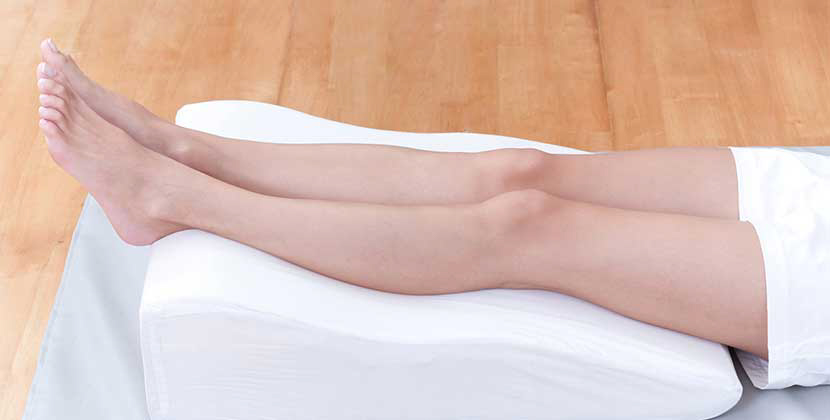Lisa Hoepner, PA-C, with North Memorial Heart & Vascular Institute explains varicose veins, common causes, treatment options, and things to consider when choosing treatment.
What are varicose veins?
Varicose veins are what we call the enlarged or protruding veins that appear twisted or buckled beneath the skin. Varicose veins can occur when the normal veins that keep blood flowing back to the heart become stretched and don’t close completely. This causes blood to go backwards and pool in the leg veins. This backward blood flow is known as reflux or venous insufficiency. Venous insufficiency and pooling of the blood in the leg veins can result in leg pain, vein damage or varicose veins.
Signs and symptoms
- Leg pain, achiness or heaviness
- Leg fatigue or leg cramps
- Swelling and discoloration on legs
- Restless legs
- Itching and/or burning
- Ulcers/open sores
- Spider veins
What are common causes?
- Pregnancy
- Prolonged standing
- Advancing age
- History of blood clots
- Injury to the veins
- Prolonged, excess fluid retention
- Being overweight (high BMI)
- Family history of varicose veins
- Liver disease, surgery, heart failure
Medical vs. cosmetic treatment?
If you have visible varicose veins, non-healing sores or any of the above symptoms and your ultrasound shows that you have venous insufficiency that is amenable to treatment, your condition will likely be considered medical and be covered by insurance after a trial of conservative therapy. If you only have spider veins and no symptoms, these can easily and successfully be treated with Sclerotherapy, but most insurance companies will consider this cosmetic and will not cover the procedure.
What are the treatment options?
Endovenous laser ablation (EVLT) is a non-surgical, minimally invasive treatment that eliminates varicose veins and treats symptoms of venous insufficiency with little or no pain, scarring or downtime. During the EVLT procedure, a thin laser fiber is inserted into the affected vein. Heat is emitted from the laser to close and seal the vein. Complications with EVLT procedures occur infrequently, but may include inflammation of superficial veins, infection and/or blood clot.
Venaseal is a non-surgical minimally invasive treatment that eliminates varicose veins and treats symptoms of venous insufficiency with little or no pain, scarring, or downtime. During the Venaseal procedure, a thin sheath is inserted into the affected vein. A medical adhesive is delivered endovenously to close the vein. There is virtually no risk of a blood clot. However, infrequently complications can occur including inflammation, infection, and, potentially, allergic reactions.
Micro phlebectomy (also known as ambulatory phlebectomy) is a minor surgical procedure that is performed in the office by a cardiologist to remove varicose veins using a specialized instrument to extract the vein via small incisions. Customers can expect to return home one hour post-procedure and usually return to normal activity in 1-2 days. This procedure is sometimes combined with EVLT. Complications with micro phlebectomy occur infrequently, but may include bleeding, infection, localized swelling, blood clot and in rare cases, nerve damage.
Sclerotherapy is non-surgical, minimally-invasive treatment used to eliminate varicose veins and similarly visible vein conditions such as:
- Spider veins
- Blue veins under the skin
- Discolorations on legs
- Small vessels that itch or burn
During the procedure, a micro-thin needle is used to inject sclerosing liquid into dilated blood vessels causing the vessels to adhere together and stop blood flow. The vessels shrink and are absorbed by the body over time. Complications with sclerotherapy occur infrequently, but may include temporary, visible discoloration along the treated area, allergic reaction, blood clot, scabbing or scarring, small skin ulcers, or formation of new blood vessels.
How do I choose the right treatment?
Cardiologists, dermatologists, primary care providers, OB/GYN providers, and other specialists may diagnose venous insufficiency and refer to a provider specializing in treatment of vein and other vascular disorders, but provider referral is not needed. You can schedule a clinic evaluation and consultation with a specialist to explore treatment options that are right for you.
Lisa Hoepner, PA-C, is board-certified with the National Commission on Certification of Physician Assistants (NCCPA). Lisa is a member of the Minnesota Academy of Physician Assistants (MAPA) and American Academy of Physician Assistants. Lisa specializes in Sclerotherapy.
Considering treatment for varicose veins? Schedule your consultation now


